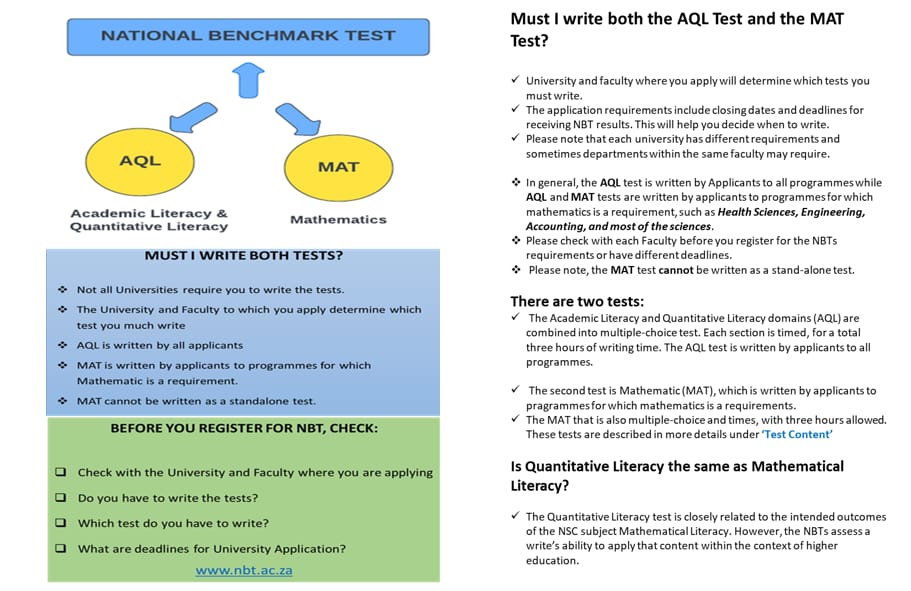
National Benchmark Tests: Purpose and Implementation in South Africa
Introduction
National benchmark tests are standardized assessments administered to students across a country to measure their academic achievement and compare their performance against national standards. These tests play a crucial role in education systems by providing valuable insights into student learning, identifying areas for improvement, and informing policy decisions. This essay explores the purpose of national benchmark tests and examines their implementation in South Africa, highlighting their benefits, challenges, and implications for education policy.
Purpose of National Benchmark Tests
National benchmark tests serve several key purposes in education systems:
Assessment of Student Achievement: These tests provide a standardized measure of student learning, allowing for comparisons across schools, districts, and regions. They assess students’ knowledge and skills in core academic subjects, such as mathematics, language arts, and science.
Identification of Learning Gaps: Benchmark tests help identify areas where students are struggling and need additional support. By analyzing test results, educators can pinpoint specific skills or concepts that require further instruction and intervention.
Monitoring Educational Progress: National benchmark tests allow for tracking student progress over time. By comparing results from different years, educators can assess the effectiveness of educational programs and make adjustments as needed.
Accountability and Transparency: Benchmark tests provide a basis for holding schools and educators accountable for student learning. They promote transparency by making student performance data publicly available, enabling parents, policymakers, and the general public to monitor the quality of education.
Policy Development: Benchmark test results inform policy decisions related to curriculum development, teacher training, and resource allocation. They help policymakers identify areas where the education system needs improvement and develop targeted interventions to address these challenges.
Implementation of National Benchmark Tests in South Africa
South Africa has implemented several national benchmark tests, including:
- Annual National Assessments (ANA): Administered to Grade 3, 6, and 9 students in mathematics, language arts, and natural sciences.
- Progress in International Reading Literacy Study (PIRLS): Assesses reading comprehension skills of Grade 4 students.
- Trends in International Mathematics and Science Study (TIMSS): Measures mathematics and science achievement of Grade 4 and 8 students.
Benefits of National Benchmark Tests in South Africa
National benchmark tests have brought several benefits to the South African education system:
- Improved Student Learning: Benchmark tests have led to increased focus on core academic skills and improved teaching practices.
- Identification of Disparities: Tests have highlighted disparities in student performance across different regions and socioeconomic groups, informing targeted interventions to address these gaps.
- Accountability and Transparency: Benchmark tests have promoted accountability among schools and educators, leading to improved educational outcomes.
- Policy Development: Test results have informed policy decisions, such as the development of new curricula and teacher training programs.
Challenges of National Benchmark Tests in South Africa
Despite their benefits, national benchmark tests also face challenges in South Africa:
- Resource Constraints: Administering and analyzing benchmark tests requires significant resources, which can be a challenge for underfunded schools.
- Cultural Bias: Critics argue that benchmark tests may be biased towards certain cultural groups or socioeconomic backgrounds, potentially disadvantaging students from marginalized communities.
- Test Anxiety: Benchmark tests can create anxiety among students and teachers, potentially affecting their performance and the validity of the results.
- Limited Scope: Benchmark tests typically focus on a narrow range of academic skills, which may not fully capture the complexities of student learning.
Implications for Education Policy
The implementation of national benchmark tests in South Africa has significant implications for education policy:
- Need for Equitable Access: Policymakers must ensure that all students have equitable access to quality education and support, regardless of their background or location.
- Focus on Student Learning: Benchmark tests should be used to inform teaching practices and improve student learning, rather than solely for accountability purposes.
- Addressing Disparities: Policymakers must prioritize interventions to address disparities in student performance and ensure that all students have the opportunity to succeed.
- Teacher Training and Support: Teachers need ongoing training and support to effectively use benchmark test results to improve their instruction.
- Data-Driven Decision-Making: Benchmark test results should be used to inform data-driven decision-making at all levels of the education system.
Conclusion
National benchmark tests play a crucial role in education systems by assessing student achievement, identifying learning gaps, and informing policy decisions. While they have brought benefits to the South African education system, they also face challenges that need to be addressed. By addressing these challenges and ensuring equitable access to quality education, South Africa can harness the power of national benchmark tests to improve student learning and achieve its educational goals.
